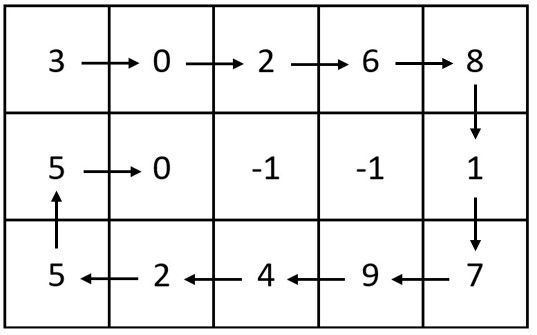给你两个整数:m 和 n ,表示矩阵的维数。
另给你一个整数链表的头节点 head 。
请你生成一个大小为 m x n 的螺旋矩阵,矩阵包含链表中的所有整数。链表中的整数从矩阵 左上角 开始、顺时针 按 螺旋 顺序填充。如果还存在剩余的空格,则用 -1 填充。
返回生成的矩阵。
示例 1:
输入:m = 3, n = 5, head = [3,0,2,6,8,1,7,9,4,2,5,5,0] 输出:[[3,0,2,6,8],[5,0,-1,-1,1],[5,2,4,9,7]] 解释:上图展示了链表中的整数在矩阵中是如何排布的。 注意,矩阵中剩下的空格用 -1 填充。
示例 2:
输入:m = 1, n = 4, head = [0,1,2] 输出:[[0,1,2,-1]] 解释:上图展示了链表中的整数在矩阵中是如何从左到右排布的。 注意,矩阵中剩下的空格用 -1 填充。
提示:
1 <= m, n <= 1051 <= m * n <= 105- 链表中节点数目在范围
[1, m * n]内 0 <= Node.val <= 1000
# Definition for singly-linked list.
# class ListNode:
# def __init__(self, val=0, next=None):
# self.val = val
# self.next = next
class Solution:
def spiralMatrix(self, m: int, n: int, head: Optional[ListNode]) -> List[List[int]]:
ans = [[-1] * n for _ in range(m)]
i = j = p = 0
dirs = [[0, 1], [1, 0], [0, -1], [-1, 0]]
while 1:
ans[i][j] = head.val
head = head.next
if not head:
break
while 1:
x, y = i + dirs[p][0], j + dirs[p][1]
if x < 0 or y < 0 or x >= m or y >= n or ~ans[x][y]:
p = (p + 1) % 4
else:
i, j = x, y
break
return ans/**
* Definition for singly-linked list.
* public class ListNode {
* int val;
* ListNode next;
* ListNode() {}
* ListNode(int val) { this.val = val; }
* ListNode(int val, ListNode next) { this.val = val; this.next = next; }
* }
*/
class Solution {
public int[][] spiralMatrix(int m, int n, ListNode head) {
int[][] ans = new int[m][n];
for (int[] row : ans) {
Arrays.fill(row, -1);
}
int i = 0, j = 0, p = 0;
int[][] dirs = {{0, 1}, {1, 0}, {0, -1}, {-1, 0}};
while (true) {
ans[i][j] = head.val;
head = head.next;
if (head == null) {
break;
}
while (true) {
int x = i + dirs[p][0], y = j + dirs[p][1];
if (x < 0 || y < 0 || x >= m || y >= n || ans[x][y] >= 0) {
p = (p + 1) % 4;
} else {
i = x;
j = y;
break;
}
}
}
return ans;
}
}/**
* Definition for singly-linked list.
* struct ListNode {
* int val;
* ListNode *next;
* ListNode() : val(0), next(nullptr) {}
* ListNode(int x) : val(x), next(nullptr) {}
* ListNode(int x, ListNode *next) : val(x), next(next) {}
* };
*/
class Solution {
public:
vector<vector<int>> spiralMatrix(int m, int n, ListNode* head) {
vector<vector<int>> ans(m, vector<int>(n, -1));
int i = 0, j = 0, p = 0;
vector<vector<int>> dirs = {{0, 1}, {1, 0}, {0, -1}, {-1, 0}};
while (1) {
ans[i][j] = head->val;
head = head->next;
if (!head) break;
while (1) {
int x = i + dirs[p][0], y = j + dirs[p][1];
if (x < 0 || y < 0 || x >= m || y >= n || ans[x][y] >= 0)
p = (p + 1) % 4;
else {
i = x, j = y;
break;
}
}
}
return ans;
}
};/**
* Definition for singly-linked list.
* type ListNode struct {
* Val int
* Next *ListNode
* }
*/
func spiralMatrix(m int, n int, head *ListNode) [][]int {
ans := make([][]int, m)
for i := range ans {
ans[i] = make([]int, n)
for j := range ans[i] {
ans[i][j] = -1
}
}
i, j, p := 0, 0, 0
dirs := [][]int{{0, 1}, {1, 0}, {0, -1}, {-1, 0}}
for {
ans[i][j] = head.Val
head = head.Next
if head == nil {
break
}
for {
x, y := i+dirs[p][0], j+dirs[p][1]
if x < 0 || y < 0 || x >= m || y >= n || ans[x][y] >= 0 {
p = (p + 1) % 4
} else {
i, j = x, y
break
}
}
}
return ans
}/**
* Definition for singly-linked list.
* class ListNode {
* val: number
* next: ListNode | null
* constructor(val?: number, next?: ListNode | null) {
* this.val = (val===undefined ? 0 : val)
* this.next = (next===undefined ? null : next)
* }
* }
*/
function spiralMatrix(m: number, n: number, head: ListNode | null): number[][] {
const dirs = [
[0, 1],
[1, 0],
[0, -1],
[-1, 0],
];
let ans = Array.from({ length: m }, v => new Array(n).fill(-1));
let i = 0,
j = 0,
k = 0;
while (head) {
ans[i][j] = head.val;
head = head.next;
let x = i + dirs[k][0];
let y = j + dirs[k][1];
if (x < 0 || x > m - 1 || y < 0 || y > n - 1 || ans[x][y] != -1) {
k = (k + 1) % 4;
}
i = i + dirs[k][0];
j = j + dirs[k][1];
}
return ans;
}
